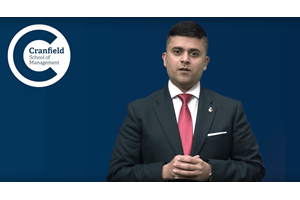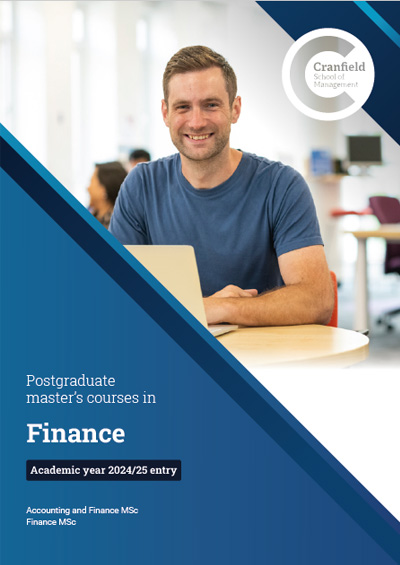Overview
- Start date30 September 2024
- Duration1 year
- DeliveryTaught modules 60%, dissertation 40%
- QualificationMSc
- Study typeFull-time
- CampusCranfield campus
Who is it for?
- Graduates with a desire to develop a career in accounting and finance such as financial controller, accounting manager, business consultant and finance experts.
- Professionals who may be considering a career change or new graduates looking to advance their skills in accounting and finance.
Class profile 2022/23*
| Gender: |
Male 66% - Female 34% |
| Age range: |
20 - 39 years |
| Average age: |
24 |
| Number of nationalities: | 13 |
| Nationality: | UK/EU: 1% - International: 99% |
| Total number of students: | 90 |
| Average class size: | 24 |
*The above data combines the 2022/23 class profiles for our Finance MSc (previously Finance and Management MSc) and Accounting and Finance MSc (previously Investment Management MSc).
Why this course?
- Cranfield School of Management consistently performs well in international business rankings. We are ranked 8th in the UK and 37th in Europe in the Financial Times European Business School 2023 Rankings.
- This course will prepare you for the world of employment as well as career development opportunities in accounting and finance.
- You will learn to apply a range of advanced accounting skills to the practice of financial reporting from a global perspective.
- You will gain an in-depth understanding of finance function practice and the changing external context in which it operates.
- You will have an opportunity to undertake academically rigorous independent research and enhance your ability to communicate ideas, arguments, and research findings effectively in written form.
- You will be taught by faculty with experience of the real world of finance and accounting, as well as having the opportunity to listen to guest speakers.
- You will have the opportunity to study within a truly international environment, with students and academics coming from over 50 countries.
Informed by Industry
An external advisory panel informs the design and development of the course, and comprises senior finance practitioners, reinforcing its relevance to the modern financial world. Our faculty are also supported by a team of international visiting industry speakers and professors who bring the latest thinking and best practice into the classroom.
Course details
The course comprises 11 core modules and two elective modules (choice out of four). This enables you to tailor the programme of study to suit your personal career plan.
Throughout the course you will have access to a comprehensive collection of resources including Bloomberg terminal, BoardEx, Capital IQ, CRSP, Datastream, Eikon, EBSCO, Factiva, FAME, Financial Times, ORBIS Bank Focus, ProQuest, Science Direct, and SDC Platinum. You will use real-world, international case studies to support your learning. The culmination of the learning process is your opportunity to undertake research for your individual thesis.
Course delivery
Taught modules 60%, dissertation 40%
Dissertation
You will undertake research for your individual thesis, enabling you to apply the knowledge and skills you have learnt during the course. This provides the opportunity to work in an original way.
Course modules
Compulsory modules
All the modules in the following list need to be taken as part of this course.
Corporate Finance
| Module Leader |
|
|---|---|
| Aim |
This core module provides a foundation in the essentials of corporate financial management. The course focuses on three principal aspects of corporate finance: the investment decision; the cost of capital; and the financing and payout decisions. Based on recent theoretical and empirical developments, the course explores the framework in which corporations make their financial and investment decisions. |
| Syllabus |
|
| Intended learning outcomes |
On successful completion of this module a student should be able to:
|
Financial Data Analysis
| Module Leader |
|
|---|---|
| Aim |
This core module aims to provide the relevant mathematical and statistical training necessary to be able to conduct appropriate empirical studies and apply theoretical financial models in practice. Specific aims include hypotheses testing & statistical inference, developing simple models, summarising data and findings, and making supportable conclusions. |
| Syllabus |
|
| Intended learning outcomes |
On successful completion of this module a student should be able to:
|
Financial Accounting
| Module Leader |
|
|---|---|
| Aim |
To introduce the fundamental accounting principles and their application to business organisations. The module relates to the measurement and recording of activities and financial transactions of a business. It provides a solid grounding in preparation of financial statements, and the interpretation and analysis of financial reports. |
| Syllabus |
|
| Intended learning outcomes |
On successful completion of this module a student should be able to:
|
International Financial Markets and Ethics
| Module Leader |
|
|---|---|
| Aim |
Part I of this module aims to provide an overview of the nature and operation of international financial markets and their traded instruments. Students are introduced to the organisation of the international financial system, the markets for foreign exchanges, stocks, bonds, commodities and derivatives, and the risks and opportunities offered in these markets and systems. The role of regulation and ethics will be highlighted and examined in Part II. This will include the aims and structures of regulation and will also provide topical focus on the role and limitations of ethics in financial markets, ethical decision-making frameworks, and cases of lapses in culture and impact upon society and the markets. |
| Syllabus |
|
| Intended learning outcomes |
On successful completion of this module a student should be able to:
|
Strategic Management
| Module Leader |
|
|---|---|
| Aim |
Strategic Management is concerned with the direction and scope of the organisation. This involves determining the purpose of the organisation, establishing objectives and formulating strategies to achieve the objectives. It predominantly explores how an organisation positions itself with regard to its changing environment, and in particular its competitors, in order to gain and sustain competitive advantage. This means that strategic management considers how an organisation’s internal resources and capabilities can be developed to meet the changing demands of customers, in such a way as to achieve the expectations and objectives of its stakeholders. |
| Syllabus |
The module begins by focusing on strategy at the strategic business unit level. It is orientated around five key questions 1) where to compete? 2) how to gain competitive advantage? 3) what capabilities are required? 4) what capabilities do we have? 5) how do we change? The module then explores corporate level strategy and the issue of strategy implementation and change. Throughout the module a range of tools and techniques for strategic analysis and choice will be introduced. |
| Intended learning outcomes |
On successful completion of this module a student should be able to:
|
Global Business Environment
| Module Leader |
|
|---|---|
| Aim |
As the world of business becomes more competitive, more dynamic, and more global, there is a growing and indeed urgent need for businesses to be critically aware of the events taking place in their wider economic environment. Businesses cannot afford to ignore the importance of changes in the external economic conditions under which commerce and business must take place. In the context of free market economy, it is imperative that students be aware of the Global Business Environment within which financial institutions operate. Recognising the importance of the external economy on business decision-making is one thing but responding to it is quite a different matter. To be able to reach sound business decisions in a dynamic economy requires all economic agents to have a clear understanding of economic interrelationships and their impact upon business. |
| Syllabus |
The initial sessions will be focused on how the economy works and the economic objectives of governments. We will then move onto how governments manage the economy, emphasis throughout this module is on the real world - theory is included only as an aid to developing a deeper and clearer understanding of the practical problems and policy challenges facing governments and nations. |
| Intended learning outcomes |
On successful completion of this module a student should be able to:
|
Business Valuation
| Module Leader |
|
|---|---|
| Aim |
To develop a good understanding of the techniques of valuation of businesses as well as the different securities issued by them, this is vital for various stakeholders including managers, investors, governments, and regulators. This understanding has a bearing on both financing decisions (issue of equity or debt) and investment decisions (identifying firm value for acquisitions, divestitures etc.). This module provides the framework for valuing businesses as well as financial modelling to aid decision making. |
| Syllabus |
|
| Intended learning outcomes |
On successful completion of this module a student should be able to:
|
Small Business Finance
| Aim |
This module focuses on financing issues faced by small business ventures firms. It explores the issues from the perspective of the small and medium firm, the investors, and the providers of debt finance. The module aims to provide students with awareness and understanding of the risk incurred by investing in a small and medium firm. It allows for an examination and evaluation of alternative financing strategies that small and medium ventures can pursue by exploring different financial tools. |
|---|---|
| Syllabus |
|
| Intended learning outcomes |
On successful completion of this module a student should be able to:
|
International Financial Reporting
| Module Leader |
|
|---|---|
| Aim |
The module builds on the introductory concepts developed in the Financial Accounting module. This module aims to equip students with advanced financial accounting techniques to prepare financial statements of listed companies in compliance with the requirements of the International Accounting Standards. |
| Syllabus |
|
| Intended learning outcomes |
On successful completion of this module a student should be able to:
|
Strategic Management Accounting
| Module Leader |
|
|---|---|
| Aim |
This module is designed to develop knowledge and skills that will enable you to apply management accounting techniques to support the strategic and operational decision making. The module focuses on the management and cost accounting fundamentals and the application of management accounting tools for planning, decision making, control and performance evaluation. |
| Syllabus |
|
| Intended learning outcomes |
On successful completion of this module a student should be able to:
|
Research Methods
| Module Leader |
|
|---|---|
| Aim |
This module is designed to provide participants with the required skills for structuring their research projects including conceptualising research questions and writing literature reviews. It introduces the need for and validity of empirical models and imparts a greater understanding of the empirical methods in accounting and finance. The module helps develop important skills in the assessment, analysis and interpretation of published research in accounting and finance. Given the huge number of alternative research designs and analytical techniques in this area, the participants should only expect to be given an overview of the principal methods and techniques. The module will equip the participants with the skills to find additional resources to help them gain a working knowledge of these methods and techniques. |
| Syllabus |
|
| Intended learning outcomes |
On successful completion of this module a student should be able to:
|
Elective modules
One of the modules from the following list need to be taken as part of this course
Private Equity
| Module Leader |
|
|---|---|
| Aim |
Private equity differs from public equity, which is generally the focus in corporate finance. Private equity has become a major source of capital for innovation, growth and corporate restructuring. To succeed as a PE professional, one needs to embrace and tackle various challenges relating to the financing of the company, its operations and the entrepreneurial and uncertain nature of business venturing. The module will cover the nature of and rationale for PE investing, the spectrum of PE activities and the potential conflicts among stakeholders. Another focus will be on value creation programmes to generate PE fund returns. |
| Syllabus |
|
| Intended learning outcomes |
Upon successful completion of this module, a student will be able to:
|
Mergers, Acquisitions and Restructuring
| Module Leader |
|
|---|---|
| Aim |
The module focuses on transactions significantly affecting the corporation’s assets, liabilities and/or equity claims and stresses the economic motives for undertaking them. Transactions are examined from the perspective of the corporation (e.g., firm managers), from the perspective of capital markets (e.g., investors, stockholders, creditors) as well as from the perspective of the society. The module integrates various technical skills learned earlier in the MSc programme such as accounting, corporate finance and strategy. |
| Syllabus |
|
| Intended learning outcomes |
On successful completion of this module a student should be able to:
|
International Public Finance and Taxation
| Module Leader |
|
|---|---|
| Aim |
This module aims to train students in both theory and applications in the field of public finance and taxation. The purpose of the module is to understand the role of the government through expenditure and taxation, as well as develop an idea on topics such as externalities and the political economy. It will expose students to frontier research on the theory behind the design of various public policies relating to the spending, taxing, and financing activities of Government. The module addresses the fundamental questions of how decisions should be made; whether tasks should be financed through the public sector or the private sector budgets? It therefore deals with public goods, and policies with respect to external effects. |
| Syllabus |
|
| Intended learning outcomes |
On successful completion of this module a student should be able to:
|
International Finance
| Module Leader |
|
|---|---|
| Aim |
This module aims to develop a solid understanding of foreign exchange and interest rate risks that multinational corporations encounter. The focus is on developing insights on how and why these risks arise and what can be done to manage these risks. The other aim is to provide students with commonly used applications of derivatives in managing exchange rate and interest rate risks. |
| Syllabus |
|
| Intended learning outcomes |
On successful completion of this module a student should be able to:
|
Keeping our courses up-to-date and current requires constant innovation and change. The modules we offer reflect the needs of business and industry and the research interests of our staff. As a result, they may change or be withdrawn due to research developments, legislation changes or for a variety of other reasons. Changes may also be designed to improve the student learning experience or to respond to feedback from students, external examiners, accreditation bodies and industrial advisory panels.
To give you a taster, we have detailed the compulsory and elective (where applicable) modules which are currently affiliated with this course. All modules are indicative only and may be subject to change for your year of entry.
Teaching team
The programme is taught by faculty experts who have extensive industry experience and who regularly work with major global financial services organisations, multinationals, and government agencies around the world. The Course Director for this course is Professor Yacine Belghitar.
Accreditation
Students who successfully complete the Cranfield Accounting and Finance MSc can join CIMA via the Master’s gateway route. Upon successfully completing the MSc in Accounting and Finance, students can register with CIMA to take an online case study exam in order to obtain the CIMA Advanced Diploma in Management Accounting (CIMA Adv Dip MA).
Your career
The Careers and Employability Service offers a comprehensive service to help you develop a set of career management skills that will remain with you throughout your career.
During your course you will receive support and guidance to help you plan an effective strategy for your personal and professional development, whether you are looking to secure your first accounting and finance role or wanting to take your career to the next level.
Cranfield graduates are highly valued in the job market and aim for careers in investment banking, financial services or the financial function of a diverse range of global corporations.
Our finance graduates have secured jobs with organisations including PricewaterhouseCoopers, Barclays Investment Bank, Bloomberg, Bank Indonesia, Lloyds Banking Group, Credit Agricole, Diageo, Ernst & Young, Thomson Reuters, Toyota, UBS and Morgan Stanley. Their roles have included Data Analyst, Financial Planner, Consultant, Private Equity Analyst and Financial Risk Manager.
How to apply
Our students do not always fit traditional academic or career paths. We consider this to be a positive aspect of diversity, not a hurdle. We are looking for a body of professional learners who have a wide range of experiences to share. If you are unsure of your suitability for our Accounting and Finance MSc programme we are happy to review your details and give you feedback before you make a formal application.
To apply you will need to register to use our online system. Once you have set up an account you will be able to create, save and amend your application form before submitting it.
Application deadlines
There is a high demand for places on our courses and we recommend you submit your application as early as possible.
Entry for September 2024
- Applications from international and European students requiring a visa to study in the UK must submit their application by Friday 12 July 2024.
- There is no application deadline for UK applicants, but places are limited, so we recommend you submit your application as early as possible.
Once your online application has been submitted together with your supporting documentation, it will be processed by our admissions team. You will then be advised by email if you are successful, unsuccessful, or whether the course director would like to interview you before a decision is made. Applicants based outside of the UK may be interviewed either by telephone or video conference.
Read our Application Guide for a step-by-step explanation of the application process from pre-application through to joining us at Cranfield.















